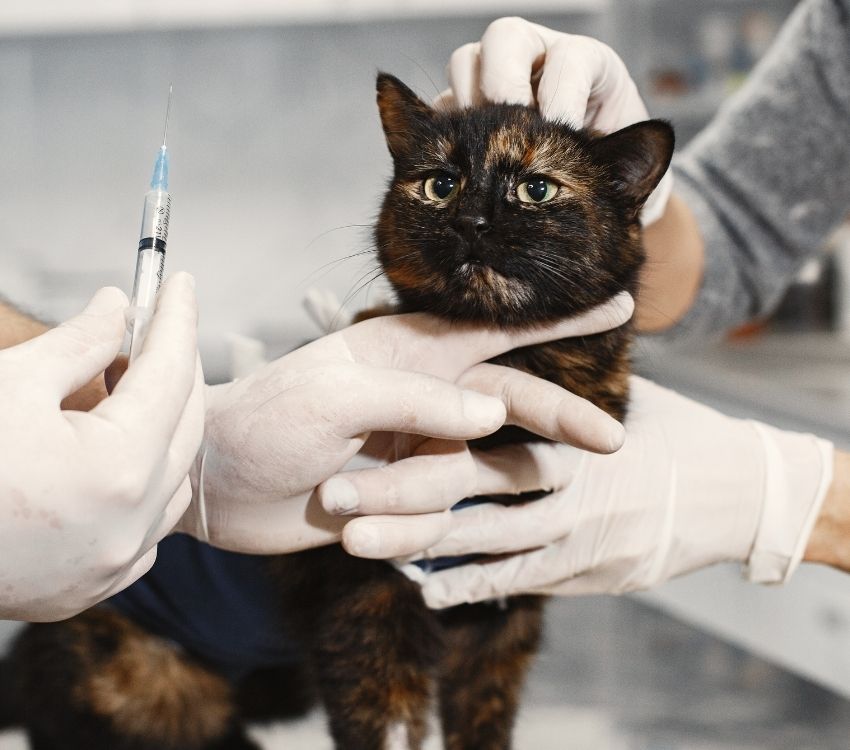Pet
Vaccinations
Pet Vaccinations by Our Homer Glen Veterinarian
Protect Your pet
with Vaccines
Our pets are faced with many deadly infectious diseases, and vaccines can help protect them. At Colonial Manor Animal Hospital, we offer core and non-core vaccines to help your pet get the protection it needs from infancy through its senior years. We customize a vaccination program for your kit or pup to suit his specific needs. By learning more about vaccines and what they have to offer, you can have greater confidence that vaccinating your pet is the right thing to do.
Understanding Vaccines
Vaccines are designed to protect your pet against life-threatening diseases. They contain harmless antigens similar to organisms that cause real damage. These antigens stimulate your pet’s immune system, and in the event, your pet is exposed to the actual disease, his immune system will automatically produce antibodies to fight against it. Your pet doesn’t have to be vaccinated against every disease. Your Homer Glen veterinary specialist can help you determine what vaccines would be best for your dog or cat. Most veterinarians agree that core vaccines are essential to a dog or cat’s health.
Types of Vaccines
Core vaccines are those considered vital to your pet’s health due to the threat they pose to your pet’s life. These vaccines differ for cats and dogs.
For your canine, core vaccinations include: rabies, canine parvovirus, canine hepatitis, and distemper.
For your feline, core vaccinations include: rabies, feline calicivirus, and feline herpesvirus type I, and distemper.
Noncore vaccinations are administered according to your pet’s risk of getting the disease. If you live in an area where the risk of certain diseases is high, we highly recommend vaccinating your pet against those particular diseases.
Some common non-core vaccines for dogs are Bordella brochiseptica (kennel cough), Borrelia burgdorferi (Lyme disease), and Leptospira bacteria.
Noncore vaccines for cats include: feline leukemia virus, Bordetella, Chlamydophila felis, and feline immunodeficiency virus.
We can help you determine what vaccines would be best for your pet, considering his age, health and lifestyle. We’ll also create a vaccination schedule that offers the best protection for your dog or cat in accordance with state vaccination laws. Most all states require rabies vaccines for pets. In some areas, however, rabies vaccines are required annually. In others, vaccines can be given every 1-3 years.
Post Vaccination Side Effects
Although the chances of side effects are small, your pet could experience mild symptoms, such as slight fever, swelling, or soreness from his vaccination. This should diminish within a day. If symptoms persist or become severe, contact your Homer Glen veterinary specialist right away.
See Your Homer Glen Vet for Pet Vaccinations
To schedule vaccinations at Colonial Manor Animal Hospital in Homer Glen, contact us at (708) 301-8200 today.
Dog Vaccinations
Dogs bring joy and companionship into our lives, and we want them to be happy and healthy for as long as possible.
Learn More
One of the ways to make sure your dog stays in the best possible health is to make sure your dog has the vaccines they need. Vaccines are categorized as either core vaccines, which are most urgent and often required by law, and non-core vaccines, which are recommended as needed by your dog’s veterinarian, depending on his lifestyle.
Core Vaccines
Dogs begin receiving core vaccines when they are still puppies, usually between 12-16 weeks of age. After that first year, booster shots are administered either once per year or once every three years. Sometimes, multiple vaccines are combined into a single dose. Core vaccines include:
- Canine Distemper Virus – This virus is caught through the air and spreads between dogs and other wild animals, including ferrets, raccoons, and foxes. This disease can lead to brain inflammation and pneumonia, both of which can be fatal. Canine distemper vaccine is often combined with the parvovirus and adenovirus vaccines.
- Parvovirus – Parvo is a highly resistant virus that dogs often catch by smelling the feces of other infected dogs. It can also live on clothing and can linger in ground soil. Bloody diarrhea, fever, and vomiting are just a few potential symptoms.
- Adenovirus (Canine Hepatitis) – This is a virus found in saliva and feces. Symptoms include fever, vomiting, and diarrhea.
- Parainfluenza – This disease is transmitted through nasal secretions. Symptoms include coughing and sneezing.
- Rabies – Rabies is passed through the bite of an infected animal. Symptoms include seizures, aggression, and paralysis. Rabies is fatal.
Non-Core Vaccines
Non-core vaccines are vaccines that are recommended based on your pet’s lifestyle. Dogs that are regularly in social situations with other dogs are often given a Bordetella vaccine. This vaccine is required by many groomers. Dogs who spend time in an environment where ticks are present need to be vaccinated against Lyme disease. Leptospira is bacteria that is found in standing water and can put some dogs at risk for liver or kidney damage. If your vet believes this may be an issue for your dog, this vaccine will also be administered.
Pet Vaccines in Homer Glen, IL
If you are looking for pet vaccines in Homer Glen, IL, the veterinary professionals at Colonial Manor Animal Hospital are ready to assist you. For more information on pet vaccines or to schedule an appointment with our veterinarian, call us at (708) 301-8200.
Cat Vaccinations
Vaccinations are essential in keeping your cat healthy and active for many years to come.
Learn More
At Colonial Manor Animal Hospital in Homer Glen, IL, we offer core and non-core vaccines to protect your cat from any infections and diseases. The vaccines we offer will improve your cat’s immune system so that, in the event of exposure to a particular life-threatening disease, the immune system automatically releases antibodies to fight the disease. These vaccines are vital. Our veterinary team will discuss with you which vaccines your cat needs.
Core Vaccines for Cats
The core vaccines are required for all cats and are administered to protect them from several diseases. They include:
- Rabies: This is a contagious virus that affects the central nervous system and the brain of your cat. It can be fatal after seven days if not treated before the symptoms appear. In most states, a rabies vaccine is a requirement by law, as it can be transmitted to other mammals or even human beings. This happens if an infected cat bites, passing it through saliva.
- Feline calicivirus (FCV): This causes severe respiratory infections, commonly in young cats. Vaccination against the virus is vital for your cat.
- Feline panleukopenia (FPV): Also known as distemper, this is a fatal viral disease that affects the blood cells in the bone marrow, skin, and intestinal tract, leading to anemic ailment. This infection is highly contagious and dangerous.
- Feline leukemia virus (FeLV): This disease causes anemia in cats and suppresses their immune systems, exposing them to other deadly infections. The vaccine is administered to protect your cat from the virus, which can be transferred from one cat to another through blood, saliva, faces, and urine.
- Feline herpesvirus (FHV1): This infection affects the cat’s upper respiratory system. The virus is spread through saliva and can be contagious.
Non-Core Vaccines for Cats
On the other hand, we also administer non-core vaccines. These may be necessary for some cats depending on their health and environment. These vaccines protect your cat from the following diseases:
- Bordetella bronchiseptica: This causes coughing, sneezing, and nasal discharge that can lead to severe pneumonia.
- Chlamydophila felis: This is caused by bacteria that affect the delicate membranes that protect the inner surface of the eyelids, leading to watery ocular discharge and inflammation.
- Feline immunodeficiency virus (FIV): This affects the immune system of the cat, making the cat susceptible to other deadly infections.
There are several other non-core vaccines that our veterinarians may recommend.
Book Your Pet’s Appointment
If you have a kitten that needs to be vaccinated or needs to keep up with your cat’s vaccine schedule, we can help. At Colonial Manor Animal Hospital in Homer Glen, IL, we can let you know what vaccines your cat needs. To schedule an appointment, call us today.


